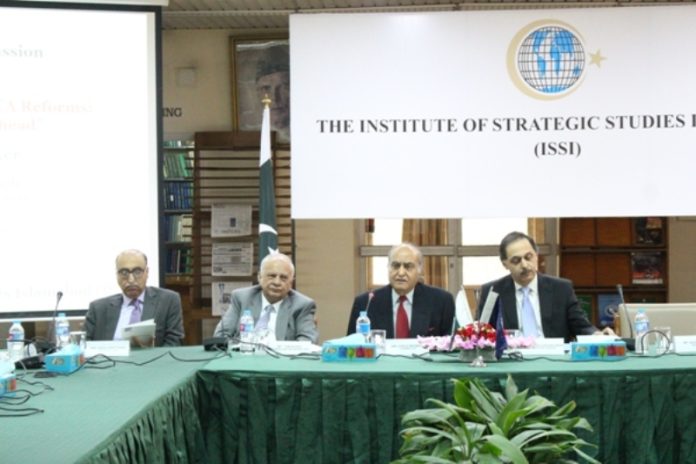Press Release
Roundtable
on
Implementation of FATA Reforms: Challenges Ahead
31 October, 2017
The idea that the people of FATA should be at the center of the reforms in that part of Pakistan prevailed as a dominant theme of the roundtable discussion organized by the Institute of Strategic Studies Islamabad on October 31, 2017 on Implementation of FATA Reforms: Challenges Ahead.
The keynote speaker at the discussion was Mr. Shehzad Arbab, former Secretary SAFRON and former Executive Director of the FATA Development Authority. Other distinguished participants of the discussion included: Former High Commissioner to India, Abdul Basit; Former Chief Secretary KPK, Khalid Aziz; Ambassador Fauzia Nasreen; Ambassador Ayaz Wazir; Brig (Rtd) Said Nazir; Naveed Ahmed; Dr. Saima Kiyani, Fatima Jinnah University; Dr. Ashraf Ali, , Z. Communications Centre for Research and Development; Mr. Naveed Ahmed Shinwari, President, Camp; and other eminent journalists and scholars.
Welcoming the participants, Chairman ISSI, Ambassador Khalid Mahmood touched upon the history of FATA under the British colonial rule in the Sub-continent. He highlighted the FATA reforms from a historical perspective and the major obstacles in their implementation: absence of effective institutional mechanism; lack of consensus and the role of foreign interference in the area. He stressed upon the need to employ a local model of development by taking all the stakeholders aboard.
Mr. Arbab Shehzad gave a brief overview of the performance and initiatives of FATA Reforms Committee. Highlighting the major challenges to the implementation of the FATA reforms, he said that these included a lack of ownership on part of the government; insufficient resources allocation for the 10 year plan; resistance from within FATA itself; capacity issues for transformation of FATA; and above all absence of a strong and stable government. Moreover, the resentment of the tribes and their reluctance to adopt to the new system narrows the prospects of development in the area. He was of the opinion that with the new election around the corner, the future course of FATA reforms is likely to stay in limbo.
Former Chief Secretary KPK, Khalid Aziz pointed out that lack of focus and understanding of the regional and tribal dynamics are at the core of the FATA dilemma. The issue is not as complicated in its nature as political expediencies are making it.
Extending the discussion further, Ambassador Ayaz Wazir appreciated the efforts of the committee but accentuated the fact that the reform package cannot be implemented in one phase. He proposed the idea of mainstreaming and localization of the development. He favored the proposal of FATA merger but with great local autonomy, which is the long due right of the people. He also suggested holding a referendum to find out the wishes of the people in FATA whether they wanted to be merged in KPK, or would want to have a separate province.
Former Commissioner to India, Abdul Basit questioned the feasibility of the FATA merger and the wishes of the people in this regard.
Ambassador Fouzia Nasreen criticized the top-down approach towards resolving the issues of FATA and suggested to apply a bottom-up approach.
Other participants voiced the same concerns and emphasized upon the inevitability of an indigenous solution of the neglected area. It was pointed out that rather than implementing the established systems in FATA that have their own problems, it was time to try something new in FATA.
Concluding the discussion, Chairman ISSI, Ambassador Khalid Mahmood opposed any hasty decisions and suggested holding more discussions to work on a well-thought out plan for fixing this troubling issue.












